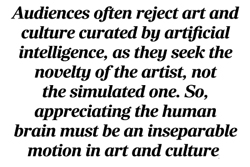AI resistant businesses and skills young people should pursue

Published :
Updated :

The efficiency of artificial intelligence (AI) often attracts organisations to adopt this technology, allowing them to save time and increase profitability. However, an important question arises: What will the future of AI look like? Will it dominate all businesses, or will some still require the human touch alongside AI? While the answer to this question may be complex, certain types of work will always benefit from human involvement-work that we could refer to as AI-proof or AI-resistant businesses.
The scope of AI will expand in the future, which may lead to the reduction of some jobs. Nonetheless, this also emphasises the importance of human intellect, sending a message to young people to develop their technical and professional skills for career advancement.

For example, imagine consulting a doctor about ongoing health issues. After listening to your concerns, the doctor prescribes medication to help you recover. Is it possible to consult a machine that would prescribe treatments with the same level of empathy and understanding? Such a task may not be possible without human insight, showing the irreplaceable value of human interaction.
This concept applies to healthcare and many other businesses that require human presence to operate effectively. In the following sections, we will discuss some of these AI-resistant businesses.
Photography skills and businesses: It may take several attempts to capture your favourite photo, so it's essential to communicate your style to the photographer. The human brain is adept at noticing updates, sharing ideas, and instructing the photographer to adjust their positioning for better shots. Unlike AI, which cannot replicate the same level of creativity and intuition, humans play a crucial role in this business.
Sustainable agriculture: Sustainable agriculture is resistant to AI and automation because it depends on ecological knowledge, hands-on management, and adaptability to local conditions, social aspects; many challenging aspects for AI to replicate. Organic farming, regenerative practices, and small-scale, diversified farms require human intuition, creativity, and direct environmental interaction. As food security and climate resilience become increasingly critical, sustainable agriculture businesses provide long-term viability, ethical benefits, and growing consumer demand, making them an innovative and future-proof investment.
Real estate business: Real estate businesses resist AI because they rely heavily on complex human interactions, negotiations, and market intuition that AI cannot fully replicate. Property valuation, client relationships, and legal processes require adaptability, trust, and emotional intelligence. Furthermore, real estate development and investment necessitate local knowledge, strategic decision-making, and an understanding of regulatory frameworks. Since housing is a fundamental human need, real estate businesses provide stability, growth potential, and resilience against automation.
Event management: Event management may be defined as a 'Combo Package' of work, as an event manager is assigned to ensure the proper workflow, which is not always pre-determined, and often the work procedure needs to be changed. Good behaviour and hospitality are also essential to being a good event manager. AI cannot be replaced in human hospitality and the ever-changing environment in this field, which clarifies that humans, not machines, are the best performers in event management.
Art and culture: Artists' creativity is depicted in their work, which is never compared with AI-based tools. Audiences often reject art and culture curate by artificial intelligence, as they seek the novelty of the artist, not the simulated one. So, appreciating the human brain must be an inseparable motion in art and culture.
Elderly care and nursing: Adequately trained individuals are assigned to care for the family's elders or sometimes ailing person, either by an agency or a person. That work is not possible to conduct with emotion and understanding with only AI.
Home services: Life in the city or metropolitan areas continues with regular office or business work. As a result, the trend of taking repair service for electronics or fixing different things at home is enhancing nowadays, but that also depends on manual work, not AI tools.
Professional grooming services: Professional grooming services include makeup artists, barbers, and others. The application of human skill is crucial for successfully conducting these tasks.
To remain relevant to AI-resistant businesses, the younger generation should develop essential skills such as emotional intelligence, which is crucial in healthcare and customer service. Enhancing creative problem-solving abilities is necessary for artistic innovation and custom manufacturing. Strong interpersonal communication skills are vital in real estate and grooming services. Adaptability is critical in dynamic industries, particularly in event management, while a solid understanding of technology aids collaboration with AI tools. Critical thinking enhances analysis in healthcare and agro-production, and attention to detail improves photography and custom manufacturing quality. Culturally competent individuals who appreciate diversity will excel in art and elderly care, while practical negotiation skills are key in business transactions. Lastly, project management abilities are necessary for organising successful events. By honing these skills, the younger generation can thrive in areas where human insight and creativity are indispensable.
AI will lead the future job sectors, but this is not always true, as the human brain will still be required for many jobs. So, the young generation should develop themselves for those jobs and enhance their skills to perform well in those jobs or businesses.
tanjimhasan001@gmail.com


 For all latest news, follow The Financial Express Google News channel.
For all latest news, follow The Financial Express Google News channel.